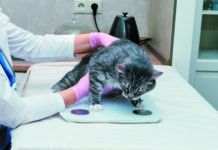Not all itchy ears are caused by ear mites. If your veterinarian has ruled out mites — or has cleared a mite infection but the itchiness continues — he or she will look for other common causes:
Food allergy. Your vet may prescribe a specific diet, often one with novel proteins such as rabbit or salmon or duck, for six to eight weeks. If it helps, “we can manage the condition as a food allergy,” says Dr. Ferrer. That may mean keeping your cat on the diet, or experimenting with re-introducing other foods to see if it’s possible to definitively identify the culprit allergen.
Environmental allergy. If changing the diet doesn’t work, it may be an allergy to something in the environment, such as pollen or mold or dust mites (not to be confused with ear mites). You vet may perform allergy testing to identify a possible cause. Treatment is often with an immune-modulating oral medication such as cyclosporine. “It’s like a steroid without being a steroid, and is prescribed specifically to treat allergies in cats.” A brand name is Atopica.
Polyps. These benign ear growths can be a consequence of chronic ear infections or inflammation — from allergies, for example. “They can cause quite a lot of discomfort, and scratching,” says Ferrer. They are usually removed surgically with the cat sedated or anesthetized. If they are very small, they may regress with topical steroid drops.
Bacterial or yeast infections. If this is the cause, antibiotic eardrops usually clear up the infection within a couple of weeks.
Whatever the cause, if your cat has itchy ears, it’s a good idea to get him or her to the vet for evaluation. While ear infections can be effectively treated, when they are left untreated they can lead to secondary infections and inflammation that is harder to treat.



